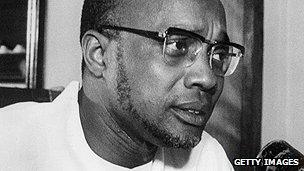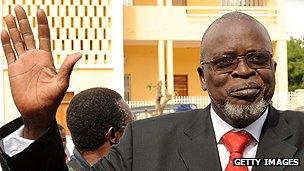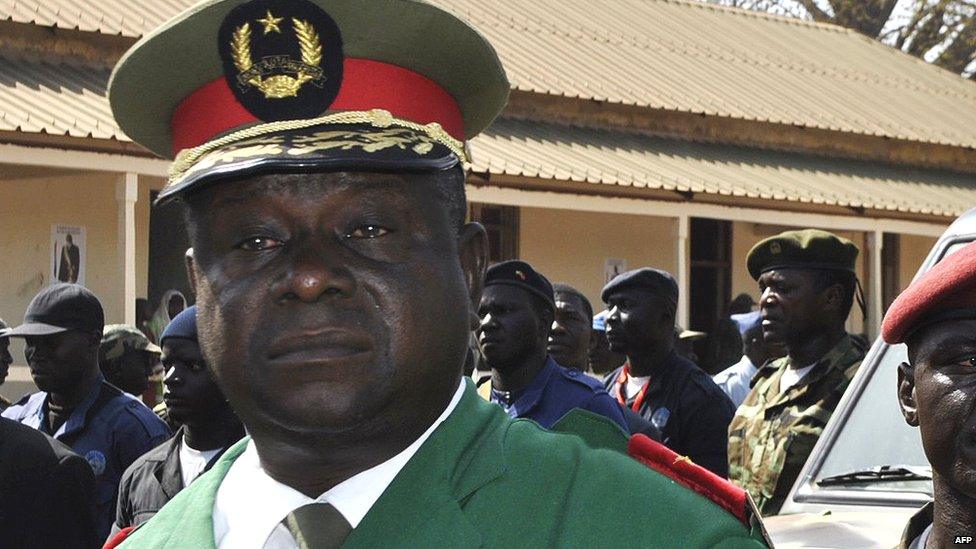Guinea-Bissau profile - Timeline
- Published
A chronology of key events:
Pre-15th century - The area of what is now Guinea-Bissau comes under the influence of the Mali Empire and becomes a tributary kingdom known as Gabu.

Amilcar Cabral fought for independence but was assassinated before Guinea-Bissau became a sovereign state
1446-47 - First Portuguese arrive; subsequently administered as part of the Portuguese Cape Verde Islands, the Guinea area becomes important in the slave-trade.
1879 - Guinea-Bissau becomes a separate colony. Portuguese control of the interior is slow and sometimes violent, and not effectively achieved until 1915.
War of independence
1951 - Guinea-Bissau declared a province of Portugal.
1956 - Amilcar Cabral establishes the African Party for the Independence of Guinea and Cape Verde (PAIGC).
1963-74 - PAIGC launches war of independence.
1973 - Amilcar Cabral assassinated. PAIGC unilaterally declares Guinea-Bissau independent of Portugal and gives it its present name.
1974 - Portugal grants Guinea-Bissau independence with Luis Cabral, Amilcar Cabral's brother, as president.
Military intervention
1980 - Luis Cabral ousted in military coup led by Joao Bernardo Vieira; plans for unification with Cape Verde dropped.
1990 - Parliament revokes the PAIGC's status as the sole legitimate party.
1994 - Vieira chosen as president in Guinea-Bissau's first free election.
1998 - Army mutinies after Vieira sacks his army commander, General Ansumane Mane, whom he accused of allowing weapons to be smuggled to rebels in Senegal.
1999 May - Soldiers led by General Ansumane Mane topple Vieira.
Military junta installs Malam Bacai Sanha, the former speaker of parliament, as interim president.
Domestic tensions
2000 January - Kumba Yala elected president.
2000 November - General Mane killed, allegedly after trying to mount a coup.
2001 January - Guinea-Bissau Resistance (RGB) party pulls out of ruling coalition saying it wasn't consulted about a cabinet reshuffle.
2001 May - IMF, World Bank suspend aid over millions missing from development funds. Towards year's end an IMF team praises improvements in financial controls.
2001 November - Foreign minister Antonieta Rosa Gomes dismissed after criticising President Yala. Increasing concern over the president's erratic behaviour.
Yala deposed

Kumba Yala is known for his trademark woolen hat
2001 December - Government says it has thwarted a coup attempt by army officers. Opposition casts doubt on allegations. Prime Minister Faustino Imbali is sacked for "failing to meet expectations".
2002 November - President Yala says he plans to dissolve parliament and call early elections. The move comes amid a long-running row with his prime minister.
2003 September - Military coup ousts President Yala. Civilian administration headed by interim President Henrique Rosa and interim Prime Minister Antonio Artur Rosa is sworn in after military and political parties agree to hold parliamentary and presidential elections.
2004 March - The former ruling PAIGC wins general election.
2004 October - Mutinous soldiers kill the head of the armed forces in pursuit of demands which include payment of outstanding wages.
Vieira returns
2005 April - Joao Bernardo Vieira, former president toppled in 1999 rebellion, returns from exile in Portugal.
2005 May - Former President Kumba Yala, who was deposed in 2003, declares that he is still the rightful head of state. He stages a brief occupation of the presidency building.
2005 July - Former military ruler Joao Bernardo Vieira wins a run-off vote in presidential elections.
2006 March-April - Guinea-Bissau soldiers battle Senegalese rebels along the southern border.
2006 October - Guinea-Bissau appeals for international help to stop people-traffickers using its remote coastline to smuggle migrants, including Asians, to Europe.
2007 March-April - Prime Minister Aristides Gomes resigns after his government loses a no-confidence vote. Martinho Ndafa Kabi is appointed as consensus prime minister.
2007 June - Donors have one last opportunity to save Guinea-Bissau from chaos and to combat Latin American drug cartels, the UN and International Monetary Fund warn.
2007 December - Parliament passes law guaranteeing amnesty for any violence committed during the years of political unrest between 1980 and 2004.
2008 August - President Vieira dissolves parliament.
2008 November - President Vieira survives a gun attack on his home by mutinous soldiers, in what appears to be a failed coup.
Vieira assassinated
2009 March - President Joao Bernardo Vieira is shot dead by renegade soldiers, hours after a bomb attack that killed the army's chief of staff, General Tagme Na Waie.

President Malam Bacai Sanha died in office
2009 July - Malam Bacai Sanha wins presidential election in a run-off.
2010 April - Mutinous soldiers briefly detain Prime Minister Carlos Gomes Junior and replace armed forces chief.
US names two top military officials as international drugs traffickers and freezes their US assets.
2010 June - Leader of April's mutiny, General Antonio Indjai, is made army chief.
2010 August - EU announces it is ending mission to reform Guinea Bissau's security forces, saying lack of respect for rule of law is making this an impossible task.
2010 October - US expresses concern over Guinea Bissau government's decision to reinstate alleged drugs kingpin Jose Americo Bubo Na Tchuto as head of navy. Mr Na Tchuto is a close ally of army chief General Antonio Indjai.
2010 December - Former army chief Jose Zamora Induta, who was arrested during April mutiny, is released from prison but days later placed under house arrest.
2011 February - EU suspends part of its aid to Guinea-Bissau because of concerns over governance and the rule of law.
2011 July-August - Thousands take to the streets to demand the resignation of Prime Minister Carlos Gomes Junior for his failure to curb rising food prices.
Instability
2011 December - Prime Minister Carlos Gomes Junior says the authorities have foiled a coup attempt against President Malam Bacai Sanha, mounted while the he was receiving medical treatment. Navy chief Jose Americo Bubo Na Tchuto is accused of masterminding the coup and arrested.

Ex-armed forces chief Antonio Indjai, who led a coup in 2012 and was sacked two years later, is suspected by the US of drug smuggling
2012 January - President Malam Bacai Sanha dies in hospital in Paris. National Assembly head Raimundo Pereira becomes interim president.
2012 April-May - Soldiers topple the government. Interim President Pereira and leading presidential contender and ex-PM Carlos Gomes Junior, are arrested. A transitional government led by Manuel Serifo Nhamadjo is formed. UN imposes travel bans on the coup leaders and key supporters.
2012 July - The UN Security Council expresses concern that drug trafficking has increased since the coup, and demands a return to constitutional rule.
2012 October - Seven killed in raid on an army barracks, which the transitional government describes as a failed coup attempt.
2013 April - US operatives arrest ex-navy chief Jose Americo Bubo Na Tchuto and charge him with drug trafficking.
2013 December - Row with Portugal over refugees from Syria, who allegedly arrived by plane from Guinea-Bissau with false documents. Guinea-Bissau's foreign minister quits, Portuguese airline TAP suspends air link.
2014 May - Presidential election run-off is won by Jose Mario Vaz.
2014 September - President Jose Mario Vaz sacks the powerful armed forces chief, Antonio Indjai, whom the US accuses of plotting to traffic cocaine and sell weapons to Colombian rebels.
2015 May - International donors pledge more than $1.1bn to help Guinea-Bissau's economy revive after years of instability.
2015-2019 - President Jose Mario Vaz sparks a political crisis by sacking a series of prime ministers in a power struggle with his opponents in the ruling PAIGC.
2020 February - Former prime minister Umaro Sissoco Embaló takes office after winning the presidential election, ending 46 years of PAIGC or military rule.